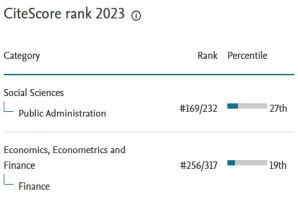A vállalati karbonsemlegesség elérésének lehetséges támogató modellje
DOI:
https://doi.org/10.35551/PFQ_2022_3_4Kulcsszavak:
fenntarthatósági kockázat, szén-dioxid-elszámolás, üvegházhatású gázokra vonatkozó protokoll, kockázatértékelés, szén-dioxid-közzétételi projekt, D81, G30, Q51Absztrakt
Cikkünkben a nemzetközileg ismert fenntarthatósági modellek módszertanára alapozva javaslatot teszünk egy újszerű, a karbonsemlegesség elérésére ösztönző döntéstámogató és kontrollingrendszer kialakítására. Az értékelő rendszer illeszkedik az üvegházhatású gázokra vonatkozó (ÜHG) protokoll szempontrendszeréhez, mindhárom Scope-kibocsátásait figyelembe veszi, lehetőséget ad benchmark-, illetve stressztesztelés lehetőségére. Vizuálisan (is) támogatja a menedzsment döntéseit, továbbá a szabályozók számára is lehetőséget kínál iparági, ágazati szintű döntések előkészítéséhez és meghozatalához. Egy új modell megalkotására különösen szükség lehet, egy olyan geopolitikai feszültséggel terhelt időszakban, amikor az egyes energiahordozók ára és hozzáférhetősége drámai módon és ütemben változhat.
Hivatkozások
von Ahsen, A., Petruschke, L., Frick, N. (2022). Sustainability Failure Mode and Effects Analysis – A systematic literature review. Journal of Cleaner Production, 363, 132413, https://doi.org/10.1016/j.jclepro.2022.132413
Bognár, F., Benedek, P. (2021). A Novel Risk Assessment Methodology – A Case Study of the PRISM Methodology in a Compliance Management Sensitive Sector. Acta Polytechnica Hungarica, 18, pp. 89–108, https://doi.org/10.12700/APH.18.7.2021.7.5
Bognár, F., Hegedűs, Cs. (2022). Description and Consequences on some Aggregation functions of PRISM (Partial Risk Map) Risk Assessment Method. Mathematics, 10, 676, https://doi.org/10.3390/math10050676
Csutora, M., Harangozó, G. (2019). Széndioxid- elszámolás a hálózati gazdaságban. Vezetéstudomány, 50(9), pp. 26–39, https://doi.org/10.14267/VEZTUD.2019.09.04
Fekete, I. (2022). A döntéshozatal támogatása a kockázatmenedzsment eszközeivel. Pénzügyi Szemle, 2022/1. különszám 28–47. oldal, https://doi.org/10.35551/PFQ_2022_s_1_2
Kendall, M. G. (1970). Rank Correlation Methods; Griffin: London
Losiewicz-Dniestrzanska, E. (2015). Monitoring of Compliance Risk in the Bank. Procedia Economics and Finance, 26, pp. 800–805, https://doi.org/10.1016/S2212-5671(15)00846-1
Makajic-Nikolic, D., Petrovic, N., Cirovic, M., Vujosevic, M., Presburger-Ulnikovic, V. (2016). The model of risk assessment of greywater discharges from the Danube River ships. Journal of Risk Research, 19, pp. 496–514, https://doi.org/10.1080/13669877.2014.988286
Poulikidou, S., Björklund, A., Tyskeng, S. (2014). Empirical study on integration of environmental aspects into product development: processes, requirements and the use of tools in vehicle manufacturing companies in Sweden. Journal of Cleaner Production, 81, pp. 34–45, https://doi.org/10.1016/j.jclepro.2014.06.001
Spearman, C. (1904). The Proof and Measurement of Association between Two Things. The American Journal of Psychology, 15, pp. 72–101, https://doi.org/10.2307/1412159
Schaltegger, S., Zvezdov, D., Günther, E., Csutora, M., Alvarez, I. (2016). Corporate Carbon and Climate Change Accounting: Application, Developments and Issues. In: Schaltegger, S., Zvezdov, D., Alvarez Etxeberria, I., Csutora, M., Günther, E. (eds) Corporate Carbon and Climate Accounting. Springer, Cham. pp. 1-25, https://doi.org/10.1007/978-3-319-27718-9_1
Schulte, J., Knuts, S. (2022). Sustainability impact and effects analysis – A risk management tool for sustainable product development. Sustainable Production and Consumption, 30, pp. 737–751, https://doi.org/10.1016/j.spc.2022.01.004
Valinejad, F., Rahmani, D. (2018). Sustainability risk management in the supply chain of telecommunication companies: A case study. Journal of Cleaner Production, 203, pp. 53–67, https://doi.org/10.1016/j.jclepro.2018.08.174
Vörösmarty, Gy., Dobos, I., (2020). A vállalatméret hatása a zöldbeszerzési gyakorlatra. Statisztikai Szemle, 98(4), pp. 301–323, https://doi.org/10.20311/stat2020.4.hu0301
A Bizottság közleménye az Európai Parlamentnek, a Tanácsnak, az Európai Gazdasági és szociális Bizottságnak és a Régiók Bizottságának „Irány az 55%!”: Az EU 2030-ra vonatkozó éghajlat-politikai célkitűzésének megvalósítása a klímasemlegesség elérése érdekében. COM/2021/550 final Brüsszel, 2021.7.14, https://eur-lex.europa.eu/legal-content/HU/TXT/?uri=CELEX%3A52021DC0550
A Tanács (EU) 2016/1841 határozata (2016. október 5.) az ENSZ Éghajlat-változási Keretegyezménye keretében létrejött párizsi megállapodásnak az Európai Unió nevében történő megkötéséről https://eur-lex.europa.eu/legal-content/HU/TXT/HTML/?uri=CELEX:32016D1841&from=HU
Carbon Disclosure Project (2021). Putting a Price on Carbon – The State of Internal Carbon Pricing by Corporates Globally. Online: https://cdn.cdp.net/cdp-production/cms/reports/documents/000/005/651/original/CDP_Global_Carbon_Price_report_2021.pdf?1618938446
Finanz Danmark (2020). Framework for Financed Emissions Accounting. Online: https://finansdanmark.dk/media/47060/fida_financedemissionsaccounting-rgbsingles.pdf
Greenhouse Gas Protocol (2004). A corporate Accounting and Reporting Standard. Online: https://ghgprotocol.org/sites/default/files/standards/ghgprotocol-revised.pdf
Greenhouse Gas Protocol (2011). Corporate Value Chain (Scope 3) Accounting and Reporting Standard - Supplement to the GHG Protocol Corporate Accounting and Reporting Standard. Online: https://ghgprotocol.org/sites/default/files/standards/Corporate-Value-Chain-Accounting-Reporing-Standard_041613_2.pdf
Intergovernmental Panel on Climate Change (2022). Climate Change 2022 – Impacts, Adaptation and Vulnerability. Online: https://www.ipcc.ch/report/ar6/wg2/downloads/report/IPCC_AR6_WGII_FinalDraft_FullReport.pdf
McKinsey & Company (2021). 2021 ESG Report – Accelerating Sustainable and Inclusive Growth. Online: https://www.mckinsey.com/spContent/bespoke/esg-pdf/pdfs/in/McKinsey_2021_ESG_Report_VF.pdf
Párizsi megállapodás (L282/4) 19.10.2016, https://eur-lex.europa.eu/legal-content/HU/TXT/?uri=celex%3A22016A1019%2801%29
Partnership for Carbon Accounting Financials (2020). The Global GHG Accounting & Reporting Standard for the Financial Industry. Online: https://ghgprotocol.org/sites/default/files/standards/The%20Global%20GHG%20Accounting%20and%20Reporting%20Standard%20for%20the%20Financial%20Industry_0.pdf
The University of Cambridge Institute for Sustainability Leadership (CISL). (2022a). Decision Making in a Nature-Positive World: Nature-based Solutions for the Food and Beverage Sector. Cambridge, UK. Online: https://www.cisl.cam.ac.uk/files/nature-based_solutions_for_the_food_and_beverage_sector1.pdf
The University of Cambridge Institute for Sustainability Leadership (CISL). (2022b). Decision Making in a Nature-Positive World: Naturebased Solutions for the Water Sector. Cambridge, UK. Online: https://www.cisl.cam.ac.uk/files/nature-based_solutions_for_the_water_sector1.pdf
The University of Cambridge Institute of Sustainability Leadership (2021). Let’s discuss climate – The essential guide to bank-client engagement. Cambridge, UK. Online: https://www.cisl.cam.ac.uk/system/files/documents/lets-discussclimate-guide-to-bank-climate-engagement-cislmay-2021.pdf
The University of Cambridge Institute of Sustainability Leadership (2020). Bank 2030: Accelerating the Transition to a Low Carbon Economy. Cambridge, UK. Online: https://www.cisl.cam.ac.uk/system/files/documents/bank-2030.pdf
##submission.downloads##
Megjelent
Hogyan kell idézni
Folyóirat szám
Rovat
License
Authors assign copyright to Pénzügyi Szemle / Public Finance Quarterly. Authors are responsible for permission to reproduce copyright material from other sources.











